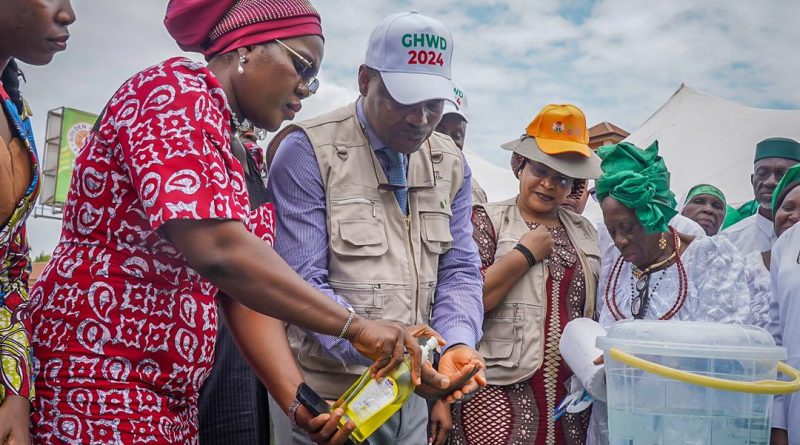Handwashing Compliance in Nigeria Remains Abysmally Low, Fuels The Spread of Infectious Diseases- Salako
About 1.8 million children under the age of 5 die each year from diarrheal diseases and pneumonia, the top two killers of young children around the world. Children and other vulnerable population are more prone to such diseases because of poor knowledge about the importance and practice of effective handwashing. In order to create and promote awareness and understanding about the importance of handwashing as an easy, effective and affordable way to prevent diseases and save lives, the United Nations General Assembly in 2008 declared 15th October of every year as Global Handwashing Day.
This years’ theme: “Why Are Clean Hands Still Important?” reflects an important question which provokes the thought that irrespective of the significant progress made in promoting handwashing with soap under running water, our journey is far from over. Dr. Iziaq Adekunle Salako, Nigeria’s Minister of State for Environment stated this at the commemoration of 2024 Global Handwashing Day held at the Garki International Market, Abuja on Tuesday, October 15. He said the theme confronts every sector and every individual with the reason to continue practicing and promoting effective handwashing and not to neglect this simple but powerful practice seeing that the benefits are limitless. He however noted that handwashing compliance in Nigeria is abysmally low.
“For the government, clean hands are crucial for public health and global health security. Promoting proper handwashing in Nigeria is a strategic move to equip the nation in its fight against disease outbreaks as well as global threats such as antimicrobial resistance (AMR). Hand hygiene inclusion in government plans and funding not only improves health but also boosts the economy by reducing the burden on health services and promoting high healthcare standards. It also contributes to attaining multiple targets of the Sustainable Development Goals on Water Sanitation and Hygiene (WASH), nutrition, education, health and economic growth”, he noted.

For businesses, including markets, the Minister said effective hand hygiene practices can significantly reduce the spread of infectious diseases leading to fewer sick days for businessmen/traders, and increased productivity. He said this could enhance marketplace well-being, support public health, and strengthen overall resilience against disruption of business.
“In schools and workplaces such as hospitals and offices, clean hands are important in preventing diseases including hospital-acquired infections, ensuring consistent school/work attendance, and increased productivity. In the home, clean hands are still very much important to maintain good health by reducing the transmission of infectious agents (germs), and lowering the risk of infections such as diarrhea, typhoid and respiratory infections. Clean hands are still important in the home to prevent cross-contamination of food thereby reducing the risk of foodborne illnesses. Very importantly clean hands help to protects vulnerable family members such as newborns, elderly and immunocompromised individuals who are more susceptible to infections.
“Clean hands remain a fundamental defense against the spread of infections, foodborne illnesses and pathogenic organisms. Practicing proper hand hygiene through handwashing with soap under running water contributes to better health outcome and safer world for everyone whether in hospitals, schools, offices, or everyday interactions. Handwashing with soap under running water helps to reduce diarrhea diseases by 30%, respiratory infections up to 20%, and can also help to reduce the transmission of outbreak-related diseases such as cholera, Lassa fever, Ebola, COVID-19, m-pox etc. Handwashing is protective against up to 50% of avoidable infections acquired during health care and also prevents the spread of antimicrobial resistance”, the Minister said.

He noted that handwashing serves to break the transmission chain of diseases like diarrhea. “It is therefore very important that the hands are washed properly using soap under running water. The hands must be washed as much as practically possible and must be washed at these critical moments such as after using the toilet, after coughing or sneezing or touching your face; after cleaning a child who has vomited or defecated; after touching books and money; before preparing food; before and after eating; and after playing with animals. When we fail to wash our hands or do so incorrectly, we can spread these germs to other people.”
According to Salako, the Federal Ministry of Environment in collaboration with stakeholders cutting across government at all levels, organized private sector, Non-Governmental Organisations (NGO’s), Community Based Organisations (CBO’s), Academia, Development Partners e.t.c has taken steps to deliver adequate sanitation and hygiene services to the citizenry. These measures include capacity building, provision of handwashing facilities in schools, advocacy/sensitization, environmental health surveillance of public places, development of policies, regulatory and legislative frame works, implementation of relevant programmes and projects, establishment of relevant regulatory and enforcement agencies etc.. Despite these measures, the Minister said the level of handwashing compliance in Nigeria remains abysmally low, thus fueling the spread of infectious diseases.
“Understanding the importance of clean hands is only the first step. While making significant progress in hand hygiene has been made, maintaining and improving hand hygiene behaviors remains crucial. To maintain this simple but crucial practice, effective collaboration of all stakeholders is imperative. Every individual, organization or business has a role to play in promoting hand hygiene. I therefore want to use this opportunity of the 2024 Global Handwashing Day commemoration to solicit the support of the Press, Development Partners, NGOs, CSOs, the Organized Private Sector, Business owners, Community Leaders and indeed everyone to prioritize effective handwashing, and invest in hand hygiene infrastructure, training and regular monitoring and behaviour infrastructure.”

On why are clean hands still important, he said the answer lies in our collective responsibility to safeguard public health, prevent infections, and promote wellbeing.
“When we prevent diseases and reduce absenteeism, we increase productivity and reduce poverty. Let therefore assure you all that the government of President Bola Ahmed Tinubu will continue to provide the needed facilities and enablement to make handwashing at home, at work and in all our daily activities seamless and easy”, the Minister stated.




